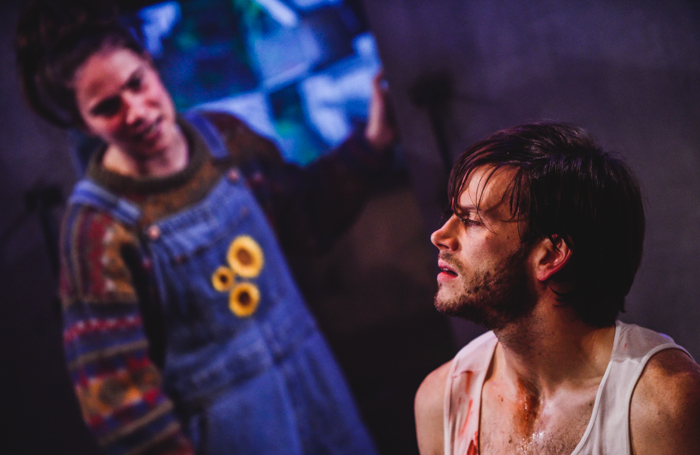
Hela (The Hunt) tells the story of a young woman (Erin’s) hunt for her missing little boy; her hunt for truth and justice and revenge and empowerment and the restitution or rescue of a Welsh culture which has been destroyed by a totalitarian, digital and male English culture. The setting of tiny abattoir on a remote farm is very well-realised by designer Delyth Evans and Set Builder Will Goad – it feels solid and real, including its digital screens and use of technology – the modern and the ancient are convincingly blended in the tiny space of ‘The Other Room’ and that is a genuine achievement.
The play attempts to meld an array of battles into one: the Welsh culture represented by a young, rural woman with poetic sensibilities and an overwhelming sense of loss is pitted against the English culture represented by Hugh, a privileged abuser, who has himself been abused and been robbed of his own Welsh-ness by abuse (the real representative of the crushing English culture being The Circle – the dystopian algorithm which dominates life and justice); there is a gender battle; a battle for language; a battle between the small, human farmer and the megalithic, abusive system; a battle over victimhood…and on it goes.
Mari Izzard’s dystopian, bilingual piece is a challenge for performers and audiences alike. The bi-lingualism is not part of the challenge – this is handled deftly and purposefully utilised – it feels central to the storm of ideas that whip through this short two-hander. Any fears that this might be grant-driven lip-service to the language were quickly dispelled.
The real challenge for the performers is in realising the intensity which this bizarre and dreadful scenario demands, The direction is not at issue here. The space is well worked; the intensity is built and relaxed appropriately and the relationship between the two figures does build quite convincingly, given the material. The huge challenge centres around the character and performance of he character of Erin. We are informed repeatedly in the early moments of the play that she looks very young; she is referred to by Hugh as a ‘child’ and she intends him, initially, to believe that she is also a prisoner of ‘The Circle’. Lowri Izzard has the unenviable task of delivering this mannered, fake naivety sufficiently to take us in, but at the same time, to give us doubts about who or what she really is. Physically, she looks right for this – there is a kind of teenage appearance in the early sections realised through movement and expression but it is distracting, unconvincing at times and irritating. We were meant to be unconvinced by it but even that wasn’t quite convincing.
Later in the piece, when we begin to see who she really is, Lowri Izzard delivers a strong and moving performance. When her character wants to torture Hugh, but can’t do more than punch and tickle him, her humanity despite her dreadful situation and what has been done to her, is moving and evident. It is only when he gets free and attacks her that she is able to commit the emasculation which is the play’s natural denouement.
Gwydion Rhys as Hugh, has much less of a challenge. I wouldn’t have fancied the role – it looked a very physically uncomfortable one, and the character, though given something of a sympathetic back-story seems a bit thin. He is too sympathetic a figure for too long and when his crimes are revealed they seem plot and issues driven and unconvincing in terms of the character. He delivers a strong realisation of the role though, undoubtedly, particularly in his delivery of the movements between English and Welsh.
In retrospect, this is a thought-provoking play, but one which tried to explore too many issues, albeit hugely important ones, in a very short piece. The later stages of the play are the strongest. Despite looking very good, the early stages of the play, once the strong opening is over, feel contrived and don’t always hold the interest. We sit outside the action rather than feeling riveted and drawn in. As the play builds, and Lowri Izzard’s performance is allowed greater rein by the writing, this does draw us in to a powerful and well-played conclusion.
